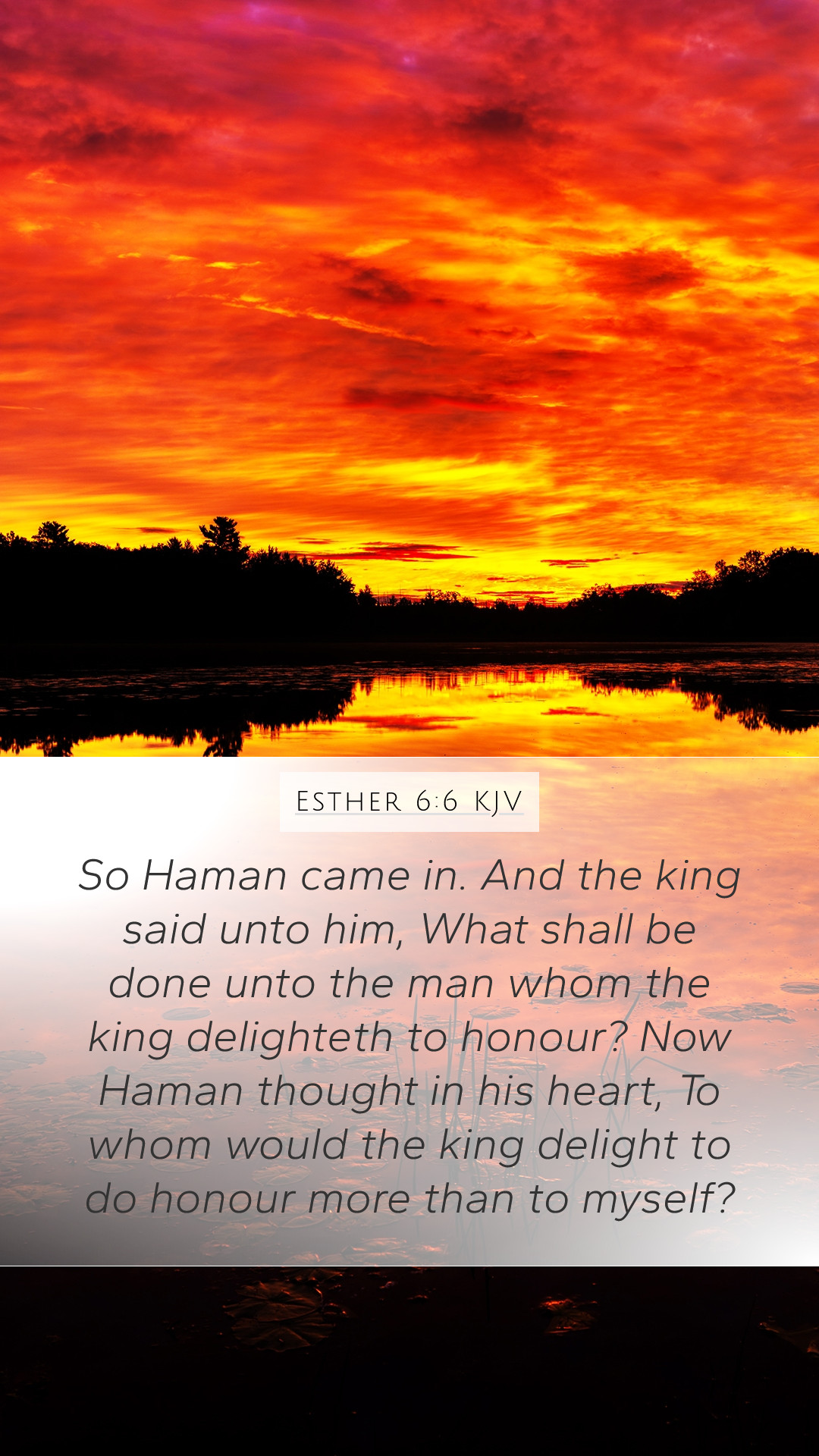Old Testament
Genesis Exodus Leviticus Numbers Deuteronomy Joshua Judges Ruth 1 Samuel 2 Samuel 1 Kings 2 Kings 1 Chronicles 2 Chronicles Ezra Nehemiah Esther Job Psalms Proverbs Ecclesiastes Song of Solomon Isaiah Jeremiah Lamentations Ezekiel Daniel Hosea Joel Amos Obadiah Jonah Micah Nahum Habakkuk Zephaniah Haggai Zechariah MalachiEsther 6:6 Meaning
What is the meaning of Esther 6:6?
So Haman came in. And the king said unto him, What shall be done unto the man whom the king delighteth to honour? Now Haman thought in his heart, To whom would the king delight to do honour more than to myself?
Esther 6:6 Bible Verse Meaning
Understanding Esther 6:6: A Biblical Analysis
Esther 6:6: "So Haman came in. And the king said to him, 'What shall be done to the man whom the king delights to honor?' Now Haman thought in his heart, 'Whom would the king delight to honor more than me?'"
Bible Verse Meaning
Esther 6:6 holds significant depth within its context. It reveals both the dramatic irony of Haman's situation and the providential hand of God at work. Let's explore this verse through various insights from public domain commentaries.
Insights from Public Domain Commentaries
-
Matthew Henry:
Henry emphasizes the foolishness of Haman's pride and assumption that the king’s question about honor was directed towards him. This reflects Haman’s self-centeredness, which ultimately leads to his downfall. Matthew Henry suggests that this verse showcases the theme of reversal often found in the biblical narrative, where the proud are humbled, and the humble are exalted.
-
Albert Barnes:
Barnes elaborates on the providential timing of Haman entering the king’s presence just as the king was contemplating honoring Mordecai. This intersection of events highlights the omnipotence of God and how He orchestrates circumstances for His purposes. Barnes draws attention to Haman’s ignorance of God’s plans, which serves as a reminder that human pride can blind one to the greater picture.
-
Adam Clarke:
Clarke delves into the psychological state of Haman, illustrating his arrogance and the delusions of grandeur surrounding his thoughts. The verse indicates Haman’s perception of himself as the most deserving of honor, which exemplifies his character. Clarke suggests this pride was integral in setting up Haman's eventual downfall, highlighting the moral lesson about the consequences of exalting oneself.
Thematic Elements
-
Divine Providence:
The events leading up to Esther 6:6 demonstrate God’s control over earthly affairs. The seemingly coincidental events are threaded together to display God's faithfulness to His people.
-
Irony and Humility:
The irony of Haman expecting praise while the king planned to honor Mordecai is a profound illustration of biblical principles regarding humility and the consequences of arrogance.
-
Character Studies:
This passage allows readers to study contrasting characters: Haman and Mordecai. Their actions reflect broader themes of honor and disgrace within God's kingdom.
Application for Daily Life
Esther 6:6 serves as a vivid reminder of the importance of humility. In a world where self-promotion is often valued, this verse encourages believers to seek true honor through humility and service rather than pride.
Bible Cross References
- Proverbs 16:18: "Pride goes before destruction, a haughty spirit before a fall."
- James 4:6: "But he gives more grace. Therefore it says, 'God opposes the proud but gives grace to the humble.'
- Galatians 6:7: "Do not be deceived: God is not mocked, for whatever one sows, that will he also reap."
Conclusion
In conclusion, Esther 6:6 encapsulates themes of divine intervention, irony, and the dangers of pride. Understanding the depth of this verse through the lenses of respected biblical commentators enriches our comprehension and appreciation of the Scriptures. It serves as a critical reminder for readers to pursue humility and be aware of God's overarching plans in their lives.


